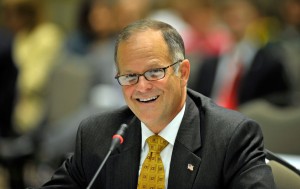News
NDSU President Participates In Second OU Presidential Candidate Forum
By: Aaron Payne
Posted on:
ATHENS, Ohio — The current president of North Dakota State University was asked about raising Ohio University’s prominence, supporting research and the importance of transparency during the second of four open forums for candidates hoping to become the next president of OU.

Dr. Dean Bresciani said Thursday he was drawn to apply for the position at Ohio University by the size of the academic community.
“When I look at an institution like OU –one of the oldest, most prestigious institutions in the United States- and that I would have the opportunity to be involved with people who are impacting more students than I would have the opportunity to do in North Dakota, how could I not be interested in this job?”
Bresciani has been serving as the president of North Dakota State and an adjunct full professor in the College of Human Development and Education since 2010.
He was previously Vice President for Student Affairs at Texas A&M University for four years, Interim Vice Chancellor for Student Affairs at the University of North Carolina at Chapel Hill, and Associate Vice Chancellor for Student Affairs at the University of Nebraska at Kearney.
Bresciani’s academic background is rooted in education. He holds a Ph.D. in High Education-Finance with a minor in Economics from the University of Arizona, a Master’s in College Student Personnel from Bowling Green State University and a Bachelor’s in Sociology from Humboldt State University.
The first audience member to ask a question alluded to Ohio University dropping in national prestige and wondered what Bresciani would do to raise the school’s prominence.
Marketing OU’s strengths would be the key, according to Bresciani.
“Not at the exclusion of other areas,” he said. “ But being thoughtful and strategic of your application of resource, you can actually lead to more success that then allows you to grow those parameters to other opportunities and potential.”
NDSU changed its image as an institution for everyone to an institution for students looking for an affordable four-year education in a rigorous research environment.
Bresciani said he would work to support research and creative from faculty at Ohio University when asked by a member of the audience.
Auditing, collecting and then effectively distributing resources amongst projects was an initiative NDSU undertook to boost research during Bresciani’s tenure. And the success allowed the core laboratories to bring in their own funds.
“Doing that obviously improved efficiency and productivity,” Bresciani said. “It also provided the opportunity for chargeback centers for externally sourcing work. So those core labs started becoming opportunities to subsidise those core labs.”
He also said supporting the work of graduate students would help enhance the overall quality of research.
Commitment to transparency was another question brought up by an audience member who referenced a 2013 incident in which was investigated for felony charge of tampering with public records.
The North Dakota Attorney General looked into allegations of 45,375 emails being deleted from Bresciani’s university email account after an open records request, according to the University Herald.
Investigations determined that the emails were not deleted, but an “auto-purge” function moved them to a separate folder and then to a tape-delay backup.
The AG released an opinion on Nov. 22, 2013 indicating the University System violated open records laws by not immediately turning over the emails upon request. However, the University System “ remedied the violation” upon locating and turning the emails over. No charges were filed.
“Conformingly, it’s not physically possible (to delete over 45,000 emails in one day)” Bresciani said Thursday. “It was something that a mainframe computer somewhere that I don’t even know did.”
Based on other questions throughout the forum, Bresciani was able to expound on:
-His support for tenure but the responsibility to explain it better to the general public.
-The “nuclear arms race” of collegiate athletics funding. (He hesitated to indicate how he would handle it at OU, not knowing the budget.)
-Openness to student activism if a clear message can be communicated.
-Good relations with the Athens community and alumni as a key to the university’s success.
-The challenges with funding higher education
The third forum is scheduled for Friday at 4:30 p.m. at the Baker University Center Ballroom. Dr. Robert Frank, who has been the president of the University of New Mexico since 2012, will be in attendance.
Read Susan Tebben’s report on all four finalists to learn more about the candidates. A recap from the first presidential forum with Dr. Duane Nellis can be read here.

